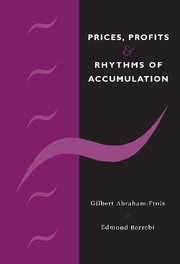Book contents
- Frontmatter
- Contents
- Preface
- 1 The golden rule of accumulation and prices
- 2 Systems of production prices
- 3 Irregular and decomposable systems
- 4 The analysis of joint production
- 5 Standards and blocking goods
- 6 Labour values and the problem of transformation
- 7 Switch in methods of production
- 8 The dynamic evolution
- Notes
- References
- Index
5 - Standards and blocking goods
Published online by Cambridge University Press: 06 July 2010
- Frontmatter
- Contents
- Preface
- 1 The golden rule of accumulation and prices
- 2 Systems of production prices
- 3 Irregular and decomposable systems
- 4 The analysis of joint production
- 5 Standards and blocking goods
- 6 Labour values and the problem of transformation
- 7 Switch in methods of production
- 8 The dynamic evolution
- Notes
- References
- Index
Summary
Seeking the invariant standard of value
Economists' search for an ‘invariant standard of value’ is similar to the search for the philosopher's stone. We know that the issue was addressed by Ricardo in section VI of The Principles of Political Economy and Taxation, entitled ‘On an invariable measure of value’, which specifies the topic of research and what is at stake.
When commodities varied in relative value it would be desirable to have the means of ascertaining which of them fell and which rose in real value, and this could be effected only by comparing them one after another with some invariable standard measure of value, which would itself be subject to none of the fluctuations to which commodities are exposed.
He also adds that even if we do not take into account a possible variation in prices due to alterations in production conditions, we have to take into account those due to changes in distribution. Since, to determine prices we need to choose a given quantity of a given commodity as a numeraire, it is quite impossible to know, when distribution varies, what part of the variation in prices is due to the commodity in question and what part is due to the commodity chosen as a numeraire. Hence the following proposition:
If, then, I may suppose myself to be possessed of a standard so nearly approaching to an invariable one, the advantage is that I shall be enabled to speak of the variations of other things without embarassing myself on every occasion with the consideration of the possible alteration in the value of the medium in which price and value are estimated.
- Type
- Chapter
- Information
- Prices, Profits and Rhythms of Accumulation , pp. 127 - 147Publisher: Cambridge University PressPrint publication year: 1997



